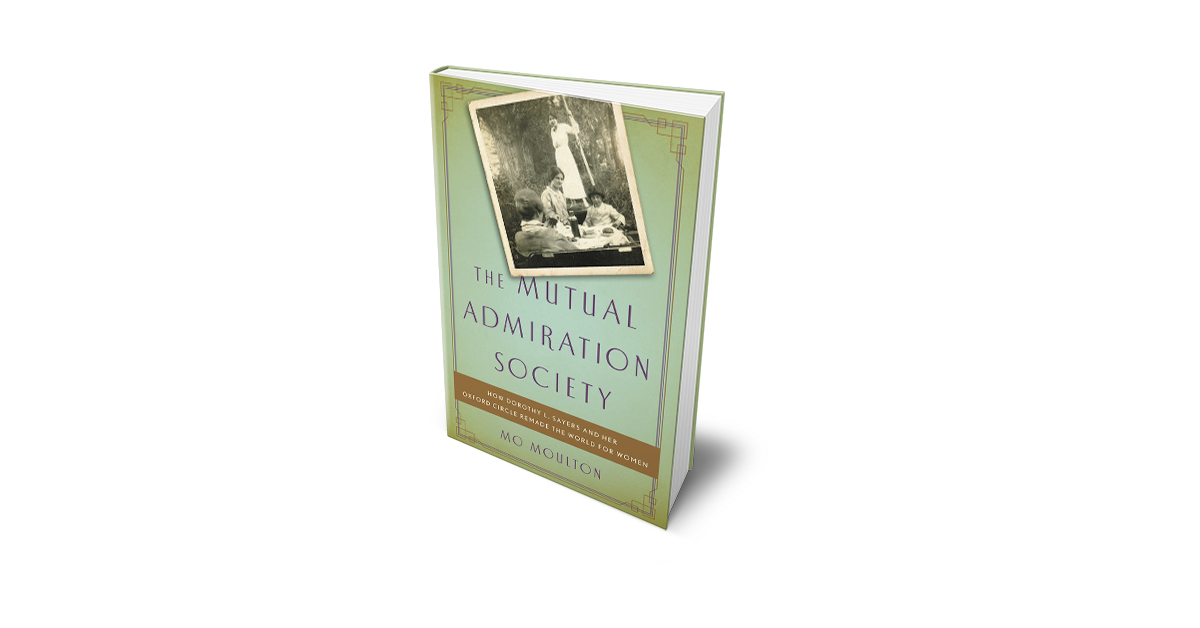Dorothy Sayers and The Mutual Admiration Society
 If you are a fan of classic mysteries, you’ve heard the name Dorothy L. Sayers. She published her first books in the 1920s around the same time as Agatha Christie, introducing the world to Lord Peter Wimsey, a British nobleman who fancies himself an amateur sleuth.
If you are a fan of classic mysteries, you’ve heard the name Dorothy L. Sayers. She published her first books in the 1920s around the same time as Agatha Christie, introducing the world to Lord Peter Wimsey, a British nobleman who fancies himself an amateur sleuth.
Sayers would go on to star in a series of novels and short stories featuring Wimsey, set between the First and Second World Wars. They are regarded as her most famous works, and many consider her Christie’s rival for the title of Queen of Crime. But there is not as much discussed, or even known, about her other works or her life.
Before Sayers was a mystery writer, she published several books of poetry. But her real love was the classics, and she translated many works, including several by Dante Alighieri. In fact, of all the novels, poetry, plays, and nonfiction she wrote, she was most proud of her translation work.
But another fascinating fact about Sayers, that is not as well known today as her books, is her fight for equal rights. In her new book, The Mutual Admiration Society How Dorothy L. Sayers and her Oxford Circle Remade the World for Women, Mo Moulton examines Sayers’s studies at Oxford in a time before they allowed women to be full members. Though she received high honors, she was not allowed a degree.
Moulton’s new book shares Sayer’s essay “Are Women Human?” in which she dissects women’s roles in society, and the idea of pursuing one’s goals, no matter a person’s gender. Sayers and her classmates banded together to fight for their rights as students, and as women, leading to lifelong friendships. Though Sayers was not seen as being overly feminist during much of her life, her time with the other women students at Oxford, who dubbed themselves “The Mutual Admiration Society,” was one of the grandest times of her life. And when Somerville College, Oxford changed their position on women students a few years later, Sayers and the Society were among the first women given a degree.
Moulton’s biography of the Mutual Admiration Society comes at a perfect time, when women are heading into 2020 shaking off societal conventions about beauty and looks, standing up against harassment and inequality in the workplace, and bonding together in strength and support of one another, much like Sayers and her friends at Somerville College, Oxford.
Though she did not write directly about her Oxford experiences with the Mutual Admiration Society, they were the influence for her last Lord Wimsey novel, Gaudy Night, in which someone is sabotaging the celebrations at the all-female Shrewsbury College at Oxford.
At the end of the 1920s, Sayers stopped writing mystery novels, for reasons unknown. (Yep, it’s a mystery.) She went back to writing religious works, and translations, right up until her death in 1957. But the greatest work she may have done was fighting the system with the Mutual Admiration Society to help secure a place in higher learning for future generations of women. And with Mo Moulton’s new book, Sayers and her friends will get a whole new wave of much-deserved recognition.
Dorothy L. Sayers is now famous for her Lord Peter Wimsey and Harriet Vane detective series, but she was equally well known during her life for an essay asking "Are Women Human?" Women's rights were expanding rapidly during Sayers's lifetime; she and her friends were some of the first women to receive degrees from Oxford. Yet, as historian Mo Moulton reveals, it was clear from the many professional and personal obstacles they faced that society was not ready to concede that women were indeed fully human.
Dubbing themselves the Mutual Admiration Society, Sayers and her classmates remained lifelong friends and collaborators as they fought for a truly democratic culture that acknowledged their equal humanity. A celebration of feminism and female friendship, The Mutual Admiration Society offers crucial insight into Dorothy L. Sayers and her world.
By clicking 'Sign Up,' I acknowledge that I have read and agree to Hachette Book Group’s Privacy Policy and Terms of Use
What to Read Next
Liberty Hardy is a Book Riot senior contributing editor, co-host of All the Books, a Book of the Month judge, and above all else, a ravenous reader. She resides in Maine with her cats, Millay, Farrokh, and Zevon. You can see pictures of her cats and book hauls on Twitter @MissLiberty and Instagram @franzencomesalive.




